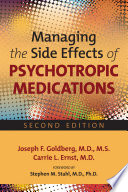Managing the Side Effects of Psychotropic Medications 2nd Edition by Joseph F Goldberg, Carrie L Ernst 9781615372034 1615372032
$50.00 Original price was: $50.00.$25.00Current price is: $25.00.
Managing the Side Effects of Psychotropic Medications 2nd Edition Joseph F Goldberg Carrie L Ernst – Ebook PDF Instant Download/Delivery, ISBN: 9781615372034, 1615372032

Product details:
- ISBN 10:1615372032
- ISBN 13:9781615372034
- Author: Joseph F Goldberg, Carrie L Ernst
Managing the Side Effects of Psychotropic Medications
Information about new psychotropic drugs, a summary of advances in knowledge about identifiable risk factors for adverse effects, and updated recommendations on viable “antidote” management strategies — including novel pharmacotherapies for tardive dyskinesia and newer agents for weight loss — are among the features of this new, second edition of Managing the Side Effects of Psychotropic Medications.
Where other psychopharmacology textbooks — and, indeed, most internships and residencies in psychiatry — lack a solid basis in primary care medicine, this guide bridges that educational gap, offering a thorough examination of all the effects of taking a psychotropic drug as well practical clinical advice on how to manage complications that arise.
The book is divided into three parts: The first deals with global issues that affect the assessment and formulation of possible adverse effects, as well as with pertinent concepts related to basic pharmacology, physiology, and medical monitoring. The second part presents information organized by individual organ systems or specific medical circumstances. The final part focuses on summary recommendations covering all the material presented in the book and is followed by helpful appendixes and self-assessment questions and resources for practitioners.
This new edition includes: Updated summaries about what psychiatrists should know regarding drug-drug interactions, iatrogenic cardiac arrhythmias, drug pressor effects and orthostatic hypotension, and drug rashes; as well as updated discussions on avoiding lithium nephrotoxicity, handling adverse effect emergencies, and understanding new FDA classifications about drug safety during pregnancy An expanded discussion on the strengths and limitations of pharmacogenetic testing to predict adverse drug effects, as well as information about new treatments for sexual dysfunction, sleep disturbances, cognitive complaints, and other maladies Revised summary tables to aid rapid assessment and management An expanded section on supplemental resources An updated and expanded self-assessment section with more key questions
Busy clinicians will find in Managing the Side Effects of Psychotropic Medications an accessible reference that provides both scientific and scholarly discussion of the consequences of drug therapies they may prescribe (or avoid), the range of available strategies to effectively manage adverse effects, and the scientific and practical implications of their treatment decisions.
Table contents:
Part I: General Considerations
1 The Psychiatrist as Physician
Primary Care Psychiatry
Differentiating Adverse Drug Effects From Primary Illness Symptoms or Nonpsychiatric Medical Problems
The Nocebo Phenomenon and Proneness to Adverse Effects
Negative Therapeutic Reactions
Attribution and Causality
Paradoxical Adverse Effects
Extrapolating “Evidence-Based Research Findings” to “Real-World” Patients
Dose Relationships and Adverse Effects
FDA Warnings and Precautions
Risk-Benefit Analyses
General Approach to Assessing Adverse Drug Effects
2 Pharmacokinetics, Pharmacodynamics, and Pharmacogenomics
Pharmacokinetics and Pharmacodynamics
Toxic Polypharmacy
Gender and Racial Differences in Adverse Effects
Alcohol
Brand Versus Generic Formulations
Enantiomeric Versus Racemic Agents, and Parent Versus Metabolite Compounds
Drug Blood Levels
Pharmacogenomic Predictors of Adverse Effects
3 Vulnerable Populations
Patients’ Diverse Proneness to Drug Side Effects
Children
Medically Ill Patients
Older Adults
Patients Prone to Somatization
4 Adverse Psychiatric Effects of Nonpsychotropic Medications
Analgesics
Anticholinergics
Anticonvulsants
Antimicrobials
Antineoplastics
Antiparkinsonian Agents
Antiviral and Antiretroviral Agents
Cardiovascular Drugs
Dermatological Agents
Gastrointestinal Agents
Hormone Supplements
Immunosuppressants
Interferon-α
Oral Contraceptives and Intravaginal Rings
Smoking Cessation Aids
Steroids
5 Adverse Psychiatric Effects of Psychiatric Medications
Activation and Mania/Hypomania or Mixed States
Anxiety and Panic
Clinical Trial Subjects With Psychiatric Illness
Discontinuation Phenomena
Disinhibition and Impaired Impulse Control
Emotional Dulling
Psychosis
Suicidal Thinking or Behavior
6 What Nonmedical Therapists Should Know About Adverse Drug Effects
Part II: Organ Systems
7 Cardiovascular System
Arrhythmias and Palpitations
Cerebrovascular Accidents
Edema
Hypertension
Myocarditis and Cardiomyopathy
Orthostatic Hypotension
8 Dermatological System
Alopecia
Hyperhidrosis
Photosensitivity
Pruritus
Skin Rashes
9 Ear, Nose, and Throat Bruxism
Dysarthria
Dysgeusia
Oral Lesions
Sialorrhea
Stomatodynia (Burning Mouth Syndrome)
Tinnitus
Xerostomia
10 Electrolyte Abnormalities
Hyponatremia and SIADH
Metabolic Acidosis and Alkalosis
11 Endocrinopathies
Bone Demineralization and Osteoporosis
Hyperprolactinemia, Galactorrhea, and Gynecomastia
Menstrual Disturbances and Polycystic Ovary Syndrome
Parathyroid Abnormalities
Thyroid Abnormalities
12 Gastrointestinal System
Diarrhea, Hypermotility, and Constipation
Gastrointestinal Bleeding
Hepatic Impairment and Transaminitis
Hyperammonemia
Malabsorption Disorders
Nausea and Gastrointestinal Upset
Pancreatitis
13 Genitourinary and Renal Systems
Dysuria and Urinary Retention
Enuresis and Urinary Incontinence
Nephrotic Syndrome
Nephrotoxicity and Nephrogenic Diabetes Insipidus
Priapism
Renal Calculi
Renal Insufficiency
Sexual Dysfunction
14 Hematological System
Myelosuppression: Agranulocytosis and Thrombocytopenia
Platelet Aggregation Disorders and Bleeding Risk
Red Blood Cells
15 Metabolic Dysregulation and Weight Gain
Dyslipidemias
Glycemic Dysregulation and Diabetes Mellitus
Weight Gain
Weight Loss
16 Musculoskeletal System
Joint Pain
Leg Cramps
Myalgias
17 Neurological System
Cognitive Complaints
Delirium and Encephalopathy
Fatigue and Sedation
Headache
Movement Disorders
Tremor
Muscle Twitching, Fasciculations, and Myoclonus
Nystagmus
Paresthesias and Neuropathies
Seizures
Yawning
18 Ophthalmological System
Cataracts
Diplopia, Blurred Vision, and Loss of Vision
Glaucoma
Retinopathies
19 Sleep Disturbances
Hypersomnia and Sleep Attacks
Insomnia
Nightmares and Vivid Dreams
Parasomnias
20 Systemic Reactions
Allergic Reactions and Angioedema
Antiepileptic Hypersensitivity Reactions
Body Temperature Dysregulation
Cancer and Excess Mortality
Discontinuation Syndromes
Drug-Induced Lupus Erythematosus
Neuroleptic Malignant Syndrome
Serotonin Syndrome
21 Pregnancy and the Puerperium
Breast-Feeding and Teratogenicity
Growth Effects
Withdrawal in the Newborn
22 Emergency Situations
Part III: Summary Recommendations
23 Summary Recommendations
People also search:
managing the side effects of psychotropic medications
managing the side effects of psychotropic medications pdf
what are the benefits of psychotropic medications
what are the side effects of psychotropic drugs
common side effects of psychotropic medications
You may also like…
Romance - Contemporary Romance
Side Effects The Prescotts Book 5 1st Edition by Tara Wyatt 9798415968107
Medicine - Neurology
Placebo effects : understanding the other side of medical care 3rd Edition Fabrizio Benedetti
Uncategorized
Managing Logistics and Transportation in the Public Sector 2nd Edition Darin L. Matthews
Earth Sciences - Geophysics
Uncategorized
Perioperative Medicine: Managing for Outcome 2nd Edition by Mark F. Newman 9780323567213 0323567215












